
Google has unveiled a new tool powered by generative artificial intelligence aimed at aiding clinicians in their search for information within patient notes, scanned documents, and other clinical data. The tool, dubbed Vertex AI Search for Healthcare, has been launched by Google Cloud and is now accessible to Google Cloud customers, as announced during the HIMSS conference in Las Vegas. This technology not only facilitates search across various clinical data sources but also provides answers to queries related to a patient's medical history. It can be seamlessly integrated into physicians' workflows, streamlining the process of accessing relevant information.
The introduction of Vertex AI Search for Healthcare adds to the growing array of generative AI-backed software offerings from tech giants like Google, Microsoft, and Amazon, as well as healthcare-specific vendors such as Oracle Cerner and Epic. These tools aim to streamline clinical notetaking and alleviate administrative burdens on healthcare professionals. Despite the adoption of such tools by numerous hospitals, concerns persist regarding the ethical use of AI in healthcare. Issues such as potential errors and the exacerbation of existing disparities remain at the forefront, compounded by a lack of regulatory oversight from the federal government.
President Joe Biden's executive order on the responsible use of AI in healthcare last fall aimed to address these concerns, but the Department of Health and Human Services (HHS) is yet to establish a regulatory framework for overseeing the deployment of AI technologies in the sector. However, industry stakeholders continue to integrate AI products into hospital and health plan operations as regulatory scrutiny looms. Google's Vertex AI Search for Healthcare stands out for its understanding of medical terminology and its ability to provide transparent answers sourced from specific data points. The technology integrates with Google's Health Data Engine and MedLM, a portfolio of algorithms trained on diverse healthcare data, enhancing interoperability and expanding its application across various healthcare use cases. Highmark Health, an integrated health system in western Pennsylvania, has already leveraged Google's components to centralize and standardize its data, creating a tool that suggests next-best actions for health plan members.
Google also announced enhancements to its MedLM capabilities, including features for the classification of chest X-rays and providing chronological lists of patient conditions. Future plans include the addition of more models, including one based on Gemini, a group of large language models released by Google.Despite recent setbacks, such as the pause in Gemini's image generation capabilities due to historically inaccurate images, Google remains committed to advancing AI technologies in healthcare. The ongoing development and deployment of tools like Vertex AI Search for Healthcare signal a continued push towards leveraging AI to enhance patient care and streamline clinical workflows